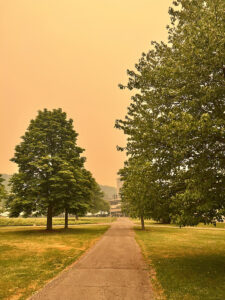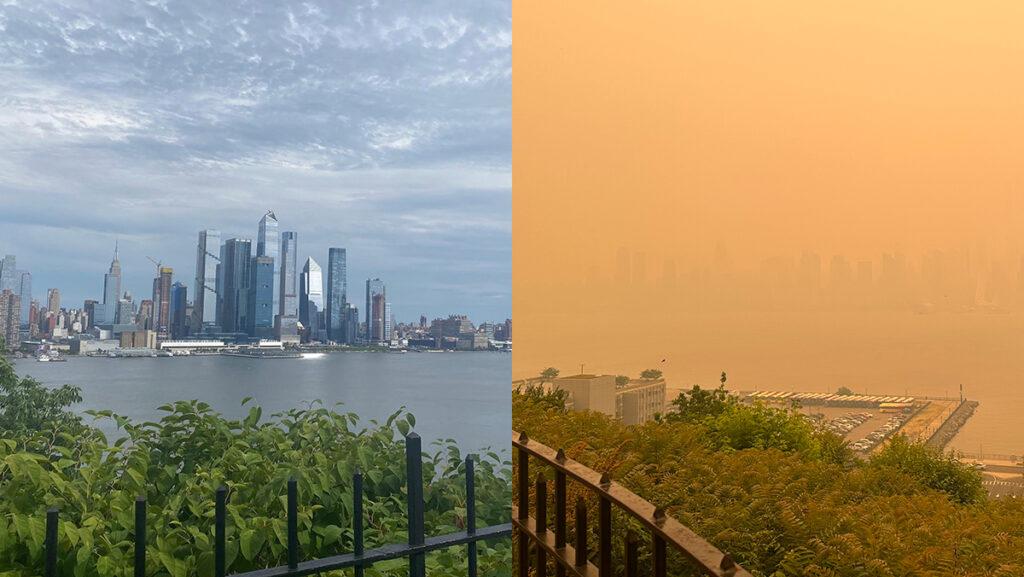Students remaining in Ithaca for the summer woke up to a yellow haze and a burning smell June 6, which lingered for several days as smoke from Canadian wildfires moved through the Northeast United States.
Tompkins County Whole Health issued an air quality health advisory June 6 after the New York State Department of Environmental Conservation issued a statewide air quality health advisory for fine particulates carried in the wildfire smoke. Fine particulates are small particles one-thirtieth the size of a human hair that can move deep into the respiratory tract and into the lungs. Exposure to fine particulates can cause sneezing, coughing, runny nose and shortness of breath. Exposure can also increase the risk of respiratory and cardiovascular illness and hospitalization, especially for children, the elderly and individuals with breathing and heart problems.
On June 6, the Tompkins County outdoor air quality level rated an average 175 on the Air Quality Index (AQI) Scale, which is above the threshold of 100 needed to issue an air quality health advisory. The health advisory was set to last until midnight June 7.
During an air health advisory, officials advise individuals to avoid spending significant time outside and to refrain from taxing work if they are outside. Also, individuals should wear high-quality masks if they spend time outside to limit the inhalation of fine particulates.
Samm Swarts, assistant director of Emergency Preparedness and Response, notified the campus community of TCWH’s poor air quality warning in an email alert to the campus community June 6. In the email alert, Swarts said the college would provide free KN95 masks for campus community members at the Public Safety Satellite Office in the Campus Center Lobby and at the Circular Information Desk on the Garden Level of the Peggy Ryan Williams Center.
Swarts said all windows on campus buildings should be closed to prevent hazardous air from entering. As a result, Swarts said the college would extend the Campus Center open hours to midnight June 7 for individuals who would like to access a space with circulated air conditioning. In later messages, Swarts said the Campus Center open hours would also be extended until midnight June 8–9.
On June 6, Swarts sent an updated message to the campus community after the New York State Department of Environmental Conservation upgraded the poor air quality advisory to an AQI air quality alert and extended the alert until midnight June 8.
In a third message sent June 7, Swarts wrote that Tompkins County continued to be under an AQI health alert. TCWH announced that the AQI had exceeded 301, the threshold for hazardous — the highest level on the scale.

New York Gov. Kathy Hochul said the air quality in the state was an “emergency crisis” and warned state residents to prepare for several days of poor air quality, according to the New York Times. Officials predicted that the dangerous air quality would continue through at least June 10 as the wildfires continued to burn and wind and weather systems were forecasted to remain the same. The AQI in Ithaca dropped below 100 and returned to the moderate range June 9.
Special Olympics New York held its State Summer Game at the college June 9—10 and moved some events indoors due to the poor air quality.
Brenna Hanratty ’23, Katrina Pohlman ’23, Karley Whalen ’23 and Carlie Wohlfahrt ’23 live together in a house off campus. The housemates said they first noticed the smoke from the wildfires June 5 when the sun looked like it was on fire as it set. Hanratty said she was alarmed when she woke up the next morning to an orange-yellow sky, which has persisted for several days.
“It feels almost apocalyptic because it’s so yellow,” Hanratty said. “It’s hazy in a way that’s not necessarily right — it feels kind of dark but it’s the middle of the day.”
Wohlfahrt said her eyes hurt and her chest felt tight when she went outside. Whalen, who has asthma, said she has felt the impact of the wildfires without even going outside, as the smoky smell seeped inside her house. Whalen’s mother bought an air purifier for her household because she worried about the unsafe air impacting Whalen’s lungs.
Whalen said that while she is concerned about the health impacts of the air, she is grateful to be distanced from the wildfires.
“If it’s this bad for us, it’s scary to think about how bad it is for people who are actually experiencing wildfires,” Whalen said.
Hanratty said she and her friends are starting to get antsy from staying inside and want to return to their typical outdoor activities. However, she said that staying inside now is worth it to prevent long-term complications.
“I think it’s important to take things like this seriously,” Hanratty said. “Obviously [the air] impacted the past few days, but it’s way better than impacting our lifetime health.”










